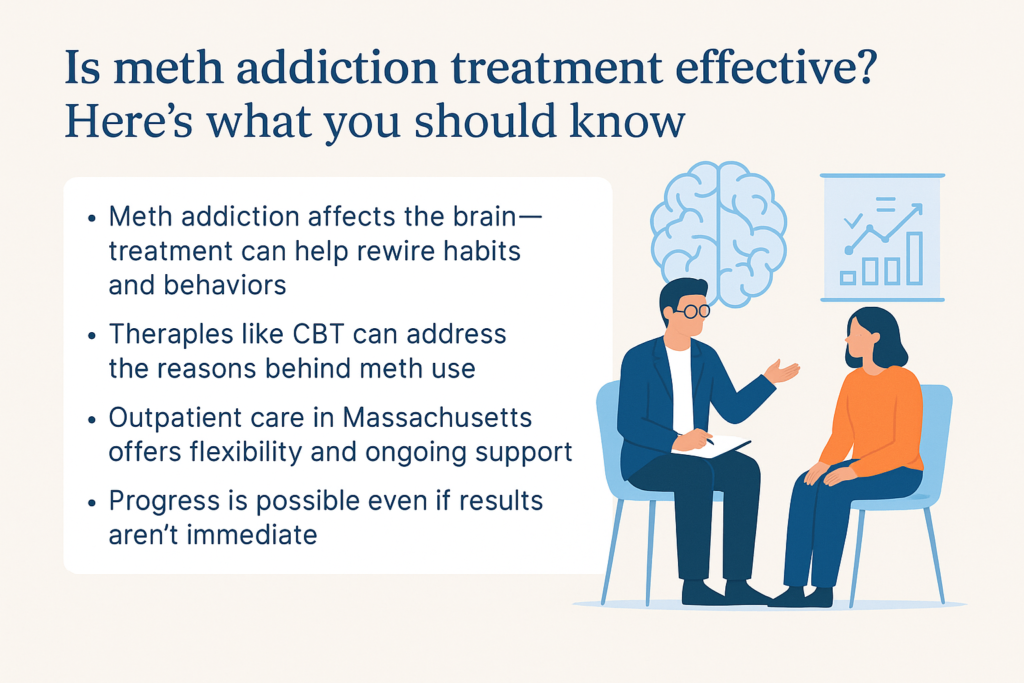If you’re reading this, you’re probably wondering: Can treatment for meth addiction actually help? Or is it just another promise that doesn’t deliver?
You’re not alone in asking that. Many people who use meth—and even those who’ve taken steps to cut back or quit—have mixed feelings about formal treatment. That’s okay. Caution doesn’t mean you’re not open. It just means you care about making the right choice.
So let’s break it down, clearly and respectfully: what meth addiction treatment is, what it isn’t, and why people in Massachusetts are quietly (and successfully) finding their way out.
What Makes Meth Addiction Treatment Effective?
Effectiveness isn’t about perfection. It’s about progress—and the tools that support it.
Treatment works best when it’s built on proven strategies that adapt to the person—not the other way around. At Foundations Group Recovery Center, we’ve seen that most success stories have a few things in common:
- Behavioral therapy that addresses the “why” behind use
- Routine and structure that support new habits
- Supportive care that feels human—not clinical or cold
- A plan for staying connected after formal treatment ends
Programs like intensive outpatient treatment (IOP) give people space to recover without losing their autonomy. For many, that’s a turning point—not being locked away, but walking through change in real life, with help.
There Is No Quick Fix—But There Is Progress
Let’s be honest: meth changes how the brain works. It affects motivation, decision-making, and mood. That’s why expecting overnight results can lead to disappointment. But that doesn’t mean recovery is out of reach.
Recovery from meth is more like rebuilding than rebooting. You might feel emotionally flat at first. You might get frustrated. But in a structured environment with people who get it, things start to shift.
“I didn’t think anything would help me stop. But slowly, I started laughing again. I started caring. That felt like a win.”
– Outpatient Client, 2023
You deserve that kind of shift. Not a fix. Not a promise. Just a steady return to clarity, connection, and choice.
Why Choose Meth Addiction Treatment in Massachusetts?
Treatment isn’t just about what happens inside a program—it’s also about what surrounds you.
In Massachusetts, people have access to:
- State-certified treatment centers like Foundations Group Recovery Center
- Experienced staff trained in stimulant-specific approaches
- Options that fit different lifestyles—IOP, group therapy, one-on-one support
- Ongoing recovery communities that reduce isolation
And for those feeling unsure, Massachusetts offers a high standard of care with a low-pressure path in. You can walk in, ask questions, and leave without committing to anything. That matters.
Whether you’re near Worcester, Boston, or the South Shore, help isn’t just out there—it’s right here.

Signs of a Treatment Program You Can Trust
Here’s the truth: Not all treatment programs are built for meth recovery. Some focus heavily on opioids or alcohol and leave meth users feeling misunderstood.
So what makes a program worth trusting?
Look for:
- Stimulant-specific education and support
- Clinicians who understand trauma and co-occurring disorders
- Group formats that avoid shame or comparison
- Flexible schedules for outpatient care
- Aftercare planning that includes relapse prevention
At Foundations, our team is trained to meet people where they are—including if you’re unsure, not ready to stop, or just exploring your options.
Curious doesn’t mean committed. It just means you’re paying attention to what might help.
You Deserve to Explore This—At Your Own Pace
You might still be asking: What if I try and it doesn’t help? What if I’m not ready to quit completely?
That’s okay.
Treatment isn’t a trap door. You’re not signing your life away. You’re opening the door to information, connection, and support—without pressure to be someone you’re not.
Meth addiction treatment in Massachusetts is about choice. Safety. Guidance when you want it. Space when you need it.
If you’re even thinking about trying something different, you’re already making progress. And we’ll meet you right there.
Ready to Talk?
You don’t have to decide everything today. But if you’re ready to learn more about what meth addiction treatment in Massachusetts could look like for you, we’re here.
Call Foundations Group Recovery Center at 844.763.4966.
No judgment. Just answers, and a chance to feel less alone.
Frequently Asked Questions About Meth Addiction Treatment
What’s the first step in getting meth addiction treatment?
The first step is often a phone call or consultation. At Foundations, we’ll walk you through options without pressure—just honest information based on where you’re at.
Does treatment mean I have to stop using right away?
Not necessarily. Many programs meet you where you are. Some clients start treatment while still using and gradually build readiness over time.
How long does meth treatment take?
It varies. Some people benefit from a 30- to 90-day outpatient program. Others need more ongoing support. We tailor it based on your needs, not a calendar.
What if I’ve tried treatment before and it didn’t work?
You’re not alone. Many people need multiple approaches before something sticks. What matters is finding a program that fits you now—not the version of you from years ago.
Is outpatient care enough for meth addiction?
For many, yes. Intensive outpatient programs (IOP) provide structure, therapy, and peer support while allowing you to stay connected to your daily life. It’s not about intensity—it’s about fit.

